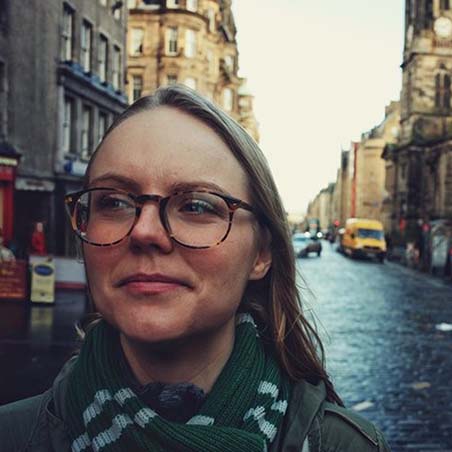Lyndsie Bourgon
Writer, Oral Historian
Bachelor of Journalism (Hons), 2008
I felt like I had reached a new level that I never thought I would.
Lyndsie Bourgon has her writing sights set on poachers. Tree poachers.
“Poaching wood around the world is incredibly lucrative,” Lyndsie says, then adds, “but people don’t always pay much attention to it because trees don’t have the same kind of charisma that, say, an elephant might have.”
Lyndsie is writing a book about tree poaching, primarily in the American Pacific Northwest but also in Peru, where the illegal trade in Amazonian timber is flourishing. She understands the environmental damage such logging causes, but more than that she is fascinated by the human stories behind the practice, what she calls the entanglement of culture and identity with the environment.
“I was doing interviews in areas of Peru where timber poaching had taken place. I did interviews about what it was like in the 70’s and how policy changed. But also about the broader relationship people had with the trees themselves. It was about how they related to the land and the forest. There was a shift from steward to guardian.”
Lyndsie says gathering the oral history of the region provides us with a deeper understanding of poaching.
“Oral history gives us the nuance. It gives us empathy. It’s not just about one person who poaches a tree, there is so much more. There are many levels as to why it happens.”
That way of thinking, Lyndsie says, began at King’s.
“I found the Foundation Year Program (FYP) incredibly challenging. But it taught me to see current events at a much deeper level by seeking out different perspectives. Putting that together with the technical skills I learned in journalism such as writing and interviewing has made me so much better at what I am doing.”
But her path to researching and writing about poaching was not straight forward. After graduating from King’s Lyndsie worked as a freelance writer and a magazine editor, living for a time in Scotland, Toronto, Haida Gwaii and back home in Alberta. It was an important time of personal discovery she says.
“I figured out what I wanted to do. I wrote more about the environment and culture. And I wanted to go back to school.”
She did. Lyndsie enrolled in a Master’s program in environmental history at the University of St Andrews in Scotland. While there she began writing a book about the illegal lumber trade. Getting to South America for research though was a difficult proposition.
“So, I applied for the early career grant from the National Geographic Society,” she says. “I was starting work on my book and I knew that I didn’t have the network and resources in Peru I needed.”
In 2018 Lyndsie was granted the title “National Geographic Explorer”. It meant financial and logistics support that launched her career as an author. Her book is scheduled for publication in the fall of 2021.
“It was a boost for my intuition—that what I was thinking about and working on was something important,” she says. “This is something that stays with you. They support you long after your project is done. I felt like I had reached a new level that I never thought I would.”
Posted: March 2020
 Connect with Lyndsie Bourgon
Connect with Lyndsie Bourgon